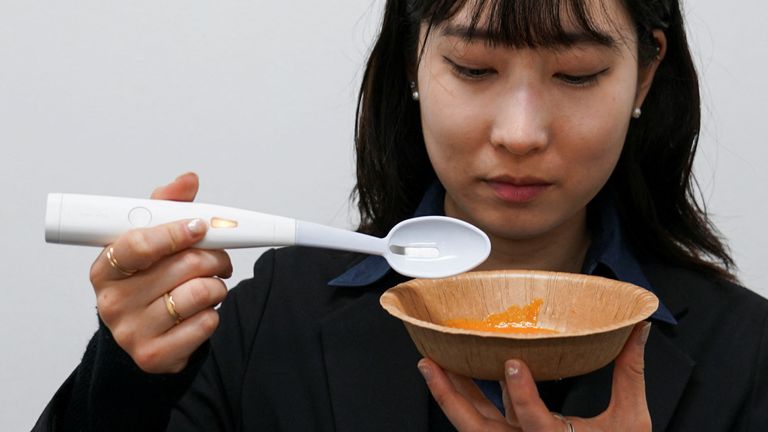A battery-operated spoon has been launched which apparently enhances the salty taste of low-sodium food without the need for extra salt.
The piece of cutlery – made of plastic and metal and being sold in Japan – is aimed at people struggling to reduce their salt intake, as researchers claim it promotes healthier eating.
Excess sodium intake is linked to increased cases of high blood pressure, strokes and other conditions.
In Japan, adults consume on average around 10g of salt a day – which is double the World Health Organisation’s recommended intake.
The Electric Salt Spoon works by passing a weak electric current through the tip of the device to concentrate sodium ion molecules on the tongue.
This magnifies the perceived saltiness of the food by one and a half times, according to its Japanese makers, Kirin.
Users can choose their preferred intensity from four different levels, said the company which is moving more into healthcare from its traditional beer business.
The object was co-developed with Meiji University professor Homei Miyashita, who previously demonstrated the taste-enhancing effect in prototype electric chopsticks using currents. He won the Ig Nobel Nutrition prize last year.
People who try to limit their salt intake often complain that food becomes tasteless, according to a survey the company carried out in 2021.
The spoon weighs 60g and runs on a rechargeable lithium battery.
Kirin is initially putting 200 of the items on sale online for 19,800 yen (£99) each.
There will then be a limited run at a Japanese retailer this month.
But the company is hoping to have one million users worldwide within five years.
“Japan has a food culture that tends to favour salty flavours,” said Kirin researcher Ai Sato.
“Japanese people as a whole need to reduce the amount of salt intake but it can be difficult to move away from what we’re used to eating.
“That’s what led us to develop this electric spoon.”

